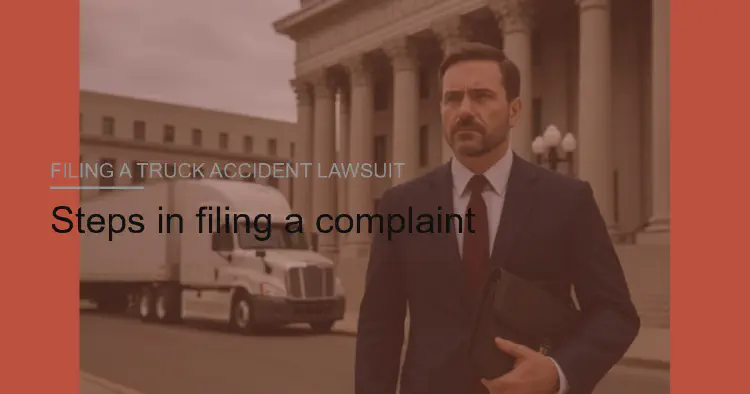Steps in filing a complaint
Filing a lawsuit after a truck accident begins with the formal complaint. This legal document initiates the case and outlines the plaintiff’s claims against the defendants.
- Truck Accident Law Team
- 2 min read
Article 3 of 6 in Filing a Truck Accident Lawsuit/

Steps in Filing a Complaint in a Truck Accident Lawsuit
1. Drafting the Complaint
- Prepared by the plaintiff’s attorney.
- Must include:
- Identification of the parties (plaintiff and defendants).
- Jurisdiction and venue justification.
- Factual allegations about the accident.
- Legal claims (e.g., negligence, wrongful death, product liability).
- Damages sought (economic, non-economic, punitive).
2. Filing With the Court
- The complaint is submitted to the clerk of court in the appropriate jurisdiction and venue.
- A filing fee is required, unless waived due to financial hardship.
3. Issuance of Summons
- The court issues a summons notifying defendants of the lawsuit.
- Summons includes deadlines for response (typically 20–30 days).
4. Service of Process
- Defendants must be formally served with the complaint and summons.
- Methods vary by state but often include personal delivery, certified mail, or professional process servers.
5. Defendant’s Response
- Defendants file an answer admitting, denying, or claiming insufficient knowledge of allegations.
- May also raise affirmative defenses (e.g., comparative negligence, statute of limitations).
6. Possible Pre-Answer Motions
- Defendants may challenge the complaint with motions to dismiss for lack of jurisdiction, improper venue, or failure to state a claim.
Legal Importance
- Filing the complaint officially starts the lawsuit and tolls (pauses) the statute of limitations.
- Precision is critical—errors in filing, naming parties, or stating claims can delay or even derail a case.
Summary: Filing a complaint is the first formal step in a truck accident lawsuit. It sets the stage by presenting allegations, legal theories, and damages, while ensuring defendants are notified and the case proceeds in court.
You might also like:
- Tags:
- Legal Importance
- Wrongful Death
- Non Economic
- Comparative Negligence
- Liability Damages
- Service Process
- Product Liability
- Statute Limitations
- Case Proceeds
- Legal Theories
- Accident Lawsuit
- Economic Non
- Vary State
- Filing Complaint
- Plaintiff Attorney
- Economic Non Economic
- Step Truck Accident
- Truck Accident Lawsuit
- Non Economic Punitive
- Dismiss Lack Jurisdiction
- Delivery Certified Mail
- Legal Importance Filing
- Lack Jurisdiction Improper
- Venue Failure State